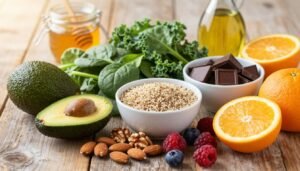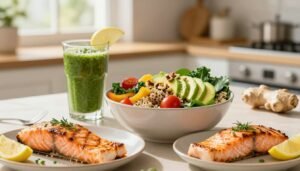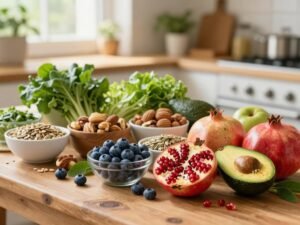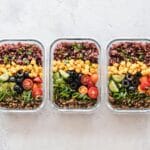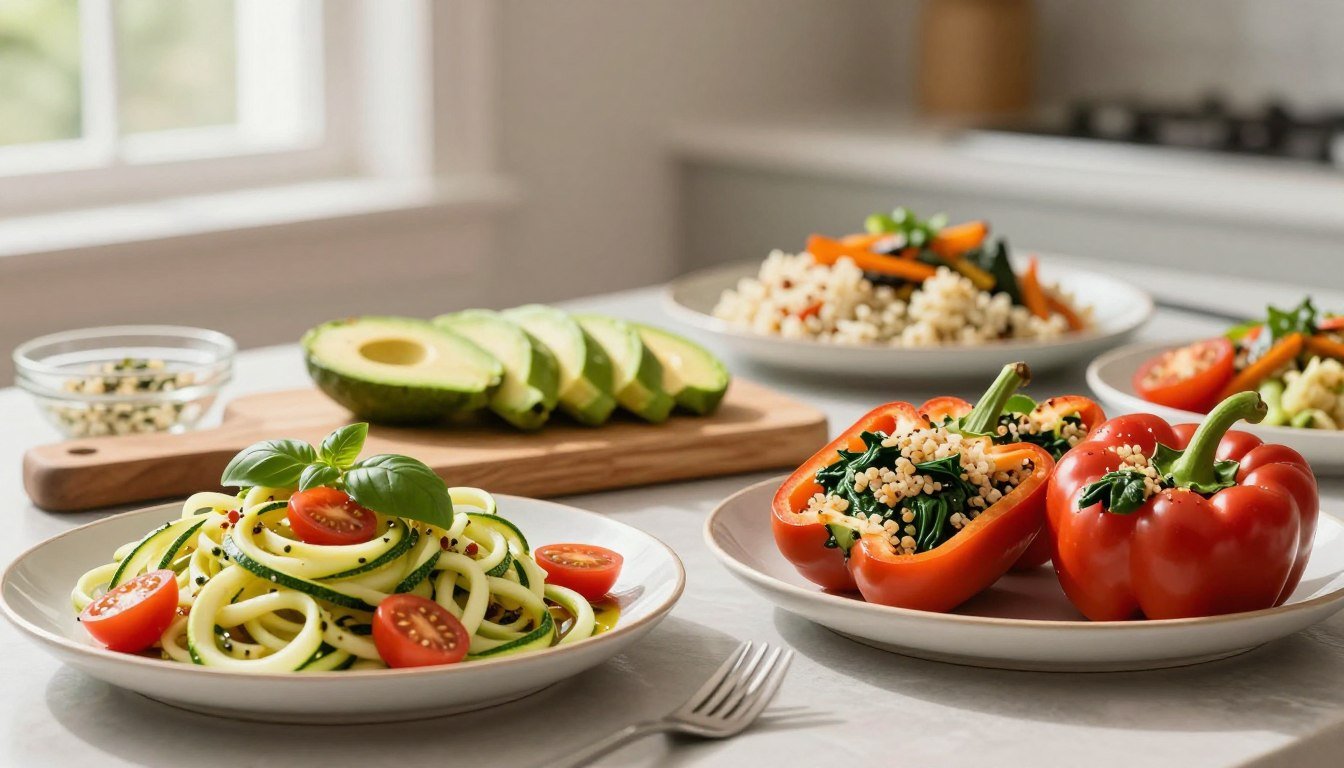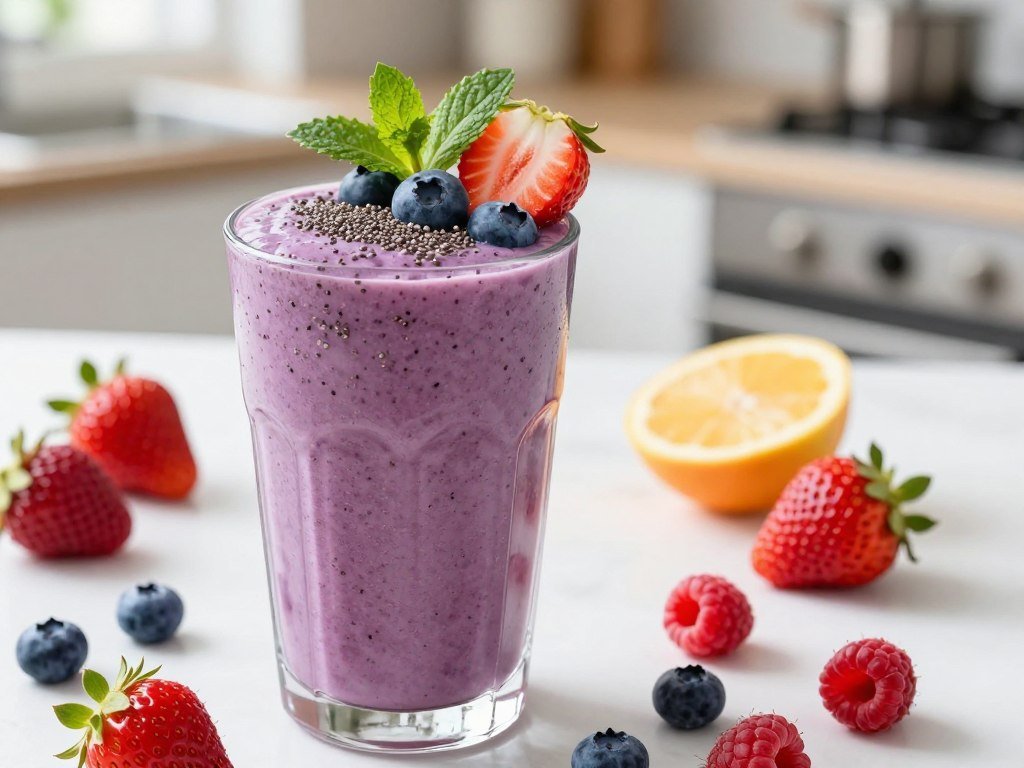As an Amazon Associate I earn from qualifying purchases.
Reduce Bloating Fast: What to Eat for Relief

Did you know that nearly 30% of the global population experiences bloating at some point?
Bloating can make life uncomfortable. But, relief is within reach with the right food choices. This article will show you which foods can help alleviate bloating. We’ll also guide you on what to eat for a more comfortable life.
Understanding bloating causes and diet’s role is key. This knowledge can lead to a bloating-free life. Let’s explore further.
Key Takeaways
- Discover the common causes of bloating and how diet plays a role.
- Learn about the foods that can help alleviate bloating.
- Understand how to incorporate bloating-relief foods into your daily meals.
- Find out how making simple dietary changes can lead to significant relief.
- Get tips on maintaining a balanced diet while managing bloating.
Understanding Bloating: Causes and Symptoms
It’s important to know what causes and shows bloating. Bloating feels like your belly is full or uncomfortable. You might also see your belly swelling.
Common Causes of Bloating
Many things can cause bloating. Food intolerances, hormonal changes, and digestive problems are some examples. For example, eating foods with lactose or gluten can make some people bloated. Hormonal shifts, like during the menstrual cycle or menopause, can also cause water retention and bloating.
How to Identify Bloating vs. Other Digestive Issues
It can be hard to tell if you have bloating or another digestive issue. But, there are some differences. Bloating usually feels like your belly is full or tight, but it doesn’t hurt a lot. If your symptoms are bad or last a long time, see a doctor to figure out what’s wrong.
Knowing the underlying causes and symptoms is the first step to feeling better. It helps improve your digestion and reduces bloating.
Why Your Diet Matters for Quick Bloating Relief
The food you eat is key to your digestive comfort. It can either help or hurt your bloating. Eating well is important for a healthy gut. This affects how your body breaks down food and handles bloating.
The Gut-Diet Connection
Your gut has trillions of tiny helpers that digest food and absorb nutrients. The foods you eat can either help or harm this balance. For example, fiber-rich foods support good bacteria, while processed foods can upset the balance.
How Food Choices Impact Digestive Comfort
Some foods can make bloating worse by being hard to digest or causing inflammation. Beans, cabbage, and broccoli are examples because they have a complex sugar called raffinose. But, foods like papaya and pineapple, which have digestive enzymes, can help.
Here are some tips for better food choices:
- Eat probiotic-rich foods like yogurt and kefir to support gut health.
- Choose low-FODMAP foods to reduce gas production.
- Opt for lean proteins and healthy fats to minimize digestive discomfort.
By making smart food choices, you can cut down on bloating and feel better. It’s all about finding the right balance for your body.
What to Eat for Bloating: Foods That Provide Fast Relief
Eating foods that help with bloating is easy. When I started eating more foods that are good for digestion, I felt much better.
Anti-Inflammatory Foods
Anti-inflammatory foods can help with bloating. They reduce inflammation in your stomach. Here are some great options:
- Turmeric: It has curcumin, which fights inflammation well.
- Ginger: It’s good for your stomach and fights inflammation.
- Leafy Greens: They’re full of antioxidants and fiber, which help reduce inflammation.
- How to Start a Low Inflammation Diet
- Daily Herbal Health Routine to Optimal-Wellness
Digestive Enzyme-Rich Foods
Digestive enzymes help break down food. This can prevent bloating. Here are some foods that are rich in them:
- Pineapple: It has bromelain, which helps with protein digestion.
- Papaya: It has papain, which breaks down proteins.
- Mangoes: They have digestive enzymes that help with nutrient absorption.
Probiotic Foods for Gut Balance
Probiotics keep your gut healthy. They help reduce bloating and other stomach problems. Here are some probiotic-rich foods:
- Yogurt: It has live cultures that are good for your gut.
- Kefir: It’s a fermented milk drink full of probiotics.
- Sauerkraut: It’s fermented cabbage that’s full of probiotics and fiber.
Eating these foods can help you feel better and have a healthier stomach.
Potassium-Rich Foods to Reduce Water Retention
Eating foods high in potassium can help fight sodium’s effects and reduce water retention. This is a big reason for bloating. Adding these foods to my diet has greatly reduced my discomfort.
Bananas and Other Fruits
Fruits are packed with potassium. Bananas are famous for their potassium, but avocados, apricots, and mangoes are also great sources.
| Fruit | Potassium Content (mg) |
|---|---|
| Banana (1 medium) | 422 |
| Avocado (1 medium) | 708 |
| Apricot (1 cup) | 427 |
Vegetables High in Potassium
Vegetables are also key for potassium. Leafy greens like spinach, broccoli, and sweet potatoes are top choices. They offer potassium and other vital nutrients.
How Potassium Counteracts Sodium
Potassium balances sodium in the body. Adequate potassium helps the body get rid of extra sodium and water. This reduces bloating and discomfort. By eating more potassium-rich foods, I keep my fluids in balance.
Fiber-Rich Foods: Finding the Right Balance
Foods high in fiber are key to easing bloating. It’s important to find the right mix. A balanced diet with the right fiber helps keep bowel movements regular and reduces discomfort.
Soluble vs. Insoluble Fiber
There are two main types of dietary fiber: soluble and insoluble. Soluble fiber turns into a gel in water, slowing digestion and helping with bloating. Insoluble fiber makes stool bulkier, promoting regular bowel movements. Both are vital for a healthy gut.
Gradually Increasing Fiber Intake
It’s crucial to slowly up your fiber intake. A big jump can cause bloating, gas, and other stomach problems. Start with small amounts of high-fiber foods and gradually increase them.
Best Sources of Bloat-Friendly Fiber
Bananas, oats, and berries are great for fiber. They’re not only high in fiber but also easy on your stomach. Adding these to your diet can help balance your fiber intake and reduce bloating.
Foods to Avoid When Bloated
If you’re dealing with bloating, it helps to know which foods to skip. Some foods can make bloating worse. It’s key to limit these in your diet.
Common Gas-Producing Foods
Some foods are known to cause gas and bloating. These include:
- Beans and legumes
- Cruciferous vegetables like broccoli and cauliflower
- Carbonated drinks
- Wheat and other gluten-containing grains for those with intolerance
Hidden Sources of Bloat-Triggering Ingredients
Processed foods often hide ingredients that can cause bloating. High-fructose corn syrup and artificial sweeteners are examples. Always read food labels to know what you’re eating.
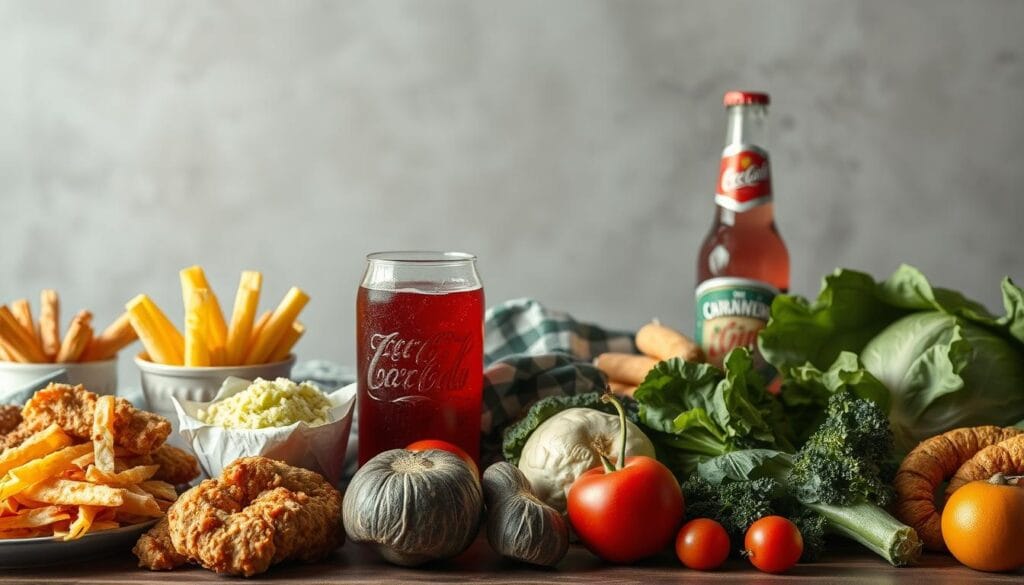
Temporary Food Eliminations
Try removing common culprits from your diet to ease bloating. This can help figure out which foods bother you. A low-FODMAP diet or avoiding gluten might help if you’re intolerant.
| Food Category | Common Culprits | Alternatives |
|---|---|---|
| Legumes | Beans, Lentils | Tofu, Tempeh |
| Dairy | Milk, Cheese | Lactose-free or non-dairy alternatives |
| Grains | Wheat, Barley | Gluten-free grains like rice or quinoa |
By watching what you eat and avoiding bloating triggers, you can feel better. This can greatly improve your digestive health.
Hydration Strategies to Reduce Bloating Fast
Drinking enough water is key for good digestion and less bloating. When we’re well-hydrated, our body can digest food better and get rid of waste. This helps avoid bloating.
Water Intake Guidelines
It’s important to drink lots of water. Try to have at least eight glasses a day. But, this can change based on how active you are and where you live. Check your urine color to see if you’re drinking enough; it should be pale yellow.
Herbal Teas for Bloating Relief
Some herbal teas can help with bloating too. Peppermint tea relaxes the digestive system. Chamomile tea calms the stomach. Ginger and fennel teas are also good choices.
- Peppermint tea
- Chamomile tea
- Ginger tea
- Fennel tea
Beverages to Avoid
Some drinks can make bloating worse. Stay away from carbonated drinks like soda and beer. They can cause gas. Caffeinated drinks can also dry you out, making bloating worse. Try to drink less sugary drinks and dairy if you can’t digest lactose well.
Meal Timing and Portion Control for Bloating Prevention
To avoid bloating, focus on when and how you eat, not just what. Adjusting your meal times and watching portion sizes can help a lot. This can make bloating symptoms much less.
Optimal Meal Spacing
Eating smaller meals more often keeps your digestive system healthy. This way, you don’t overload it, which helps avoid bloating. Try to have three main meals and one or two snacks in between. This keeps your eating balanced and prevents too much or too little food at once.
The Impact of Eating Speed
Eating fast can make you swallow air, causing bloating. Eating slowly lets your body digest food better and cuts down gas. So, take your time, chew well, and pause between bites.
Mindful Eating Practices
Mindful eating means eating fully, enjoying your food, and listening to your body’s hunger and fullness. This can stop you from eating too much and reduce bloating. Being mindful makes eating a pleasure while keeping your digestive system in check.
5 Quick-Relief Recipes to Reduce Bloating Fast
I’ve found some recipes that quickly help with bloating. They’re tasty and full of ingredients that ease bloating.
Anti-Bloat Smoothie Recipes
Smoothies are great for reducing bloating. Try blending 1 banana, 1/2 cup of pineapple, 1/2 cup of coconut water, and some spinach. The banana’s potassium and pineapple’s anti-inflammatory effects can calm your stomach.
For another option, make a berry bliss smoothie. Use 1 cup of mixed berries, 1/2 cup of Greek yogurt, and 1 tablespoon of chia seeds. The yogurt’s probiotics and chia seeds’ fiber support your gut and reduce bloating.
Digestive-Friendly Meals
For a quick meal, try a quinoa salad with roasted veggies. Quinoa’s fiber helps with digestion, and roasted veggies like carrots and zucchini are easy on your stomach. Mix cooked quinoa with your favorite roasted veggies, lemon juice, and olive oil.
Grilled chicken with steamed green beans is also good for digestion. Chicken is easy to digest, and green beans are low in FODMAPs, which helps with bloating.
Soothing Teas and Infusions
Warm tea can soothe your stomach. Peppermint tea is a classic for bloating relief. It relaxes your stomach muscles. Just steep fresh peppermint leaves in hot water, then strain and enjoy.
Ginger tea is another soothing choice. Steep fresh ginger in hot water. Ginger’s anti-inflammatory properties help with nausea and bloating.
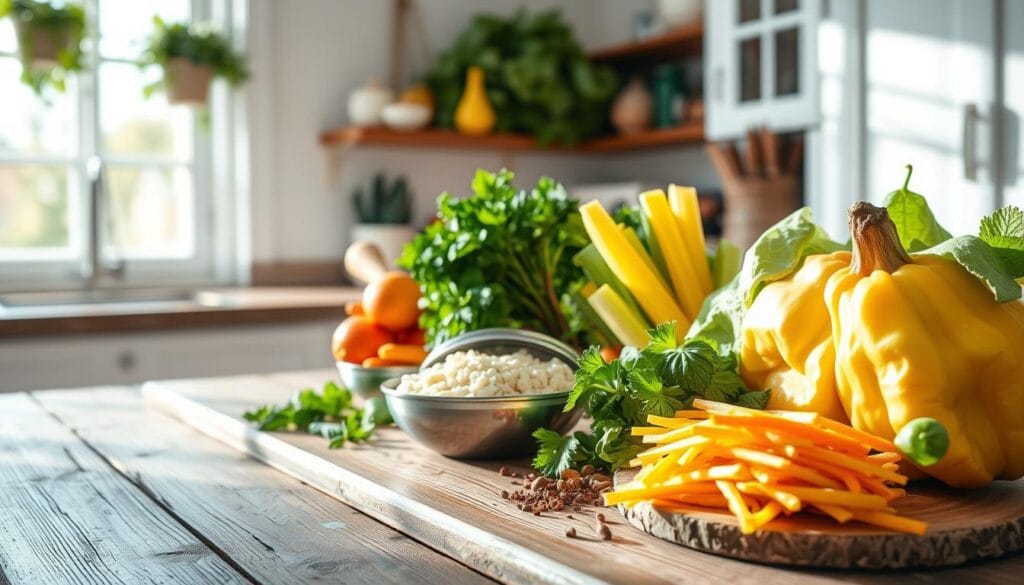
These recipes are just a few examples of healthy, tasty options for reducing bloating. Adding them to your diet can help you feel more comfortable and bloat-free.
Lifestyle Changes That Complement Dietary Approaches
Making lifestyle changes can help with bloating, along with diet. Simple adjustments can boost your digestive health and cut down on bloating.
Physical Activity for Digestive Health
Regular exercise can kickstart digestion and ease bloating. Try moderate activities like brisk walking or yoga to boost gut health. Aim for 30 minutes of activity daily for best results.
Stress Management Techniques
Stress can make bloating worse. It’s key to manage stress daily. Try deep breathing, meditation, or muscle relaxation to ease stress and aid digestion. Regular use can greatly reduce bloating symptoms.
Sleep Quality and Digestion
Good sleep is vital for digestion. Poor sleep can upset gut bacteria, causing more bloating. Aim for 7-8 hours of sleep each night and keep a regular sleep schedule for better digestion.
Adding these lifestyle changes to your diet can lead to quicker and more effective bloating relief.
When to See a Doctor About Chronic Bloating
Chronic bloating can be more than just uncomfortable; it may signal an underlying health issue. While it’s common to experience bloating from time to time, persistent or severe bloating can indicate a more serious condition.
Warning Signs That Require Medical Attention
If you experience any of the following symptoms, it’s essential to consult a healthcare professional:
- Severe abdominal pain
- Vomiting or blood in the stool
- Significant weight loss
- Changes in bowel habits
Potential Underlying Conditions
Chronic bloating can be associated with various health conditions, including:
| Condition | Description |
|---|---|
| Irritable Bowel Syndrome (IBS) | A disorder affecting the large intestine, causing bloating, abdominal pain, and changes in bowel movements. |
| Gastroparesis | A condition where the stomach takes too long to empty its contents, leading to bloating and discomfort. |
| Celiac Disease | An autoimmune disorder where the ingestion of gluten leads to damage in the small intestine, causing bloating and other symptoms. |
What to Expect at Your Appointment
During your visit, your doctor will likely conduct a physical examination, review your medical history, and may order diagnostic tests to determine the cause of your bloating. Be prepared to discuss your symptoms, dietary habits, and any factors that seem to trigger or relieve your bloating.
Conclusion: Your 7-Day Plan to Reduce Bloating
We’ve looked at why bloating happens and how certain foods can help. Now, it’s time to use this info to feel better. Eating foods that fight inflammation, are high in potassium, and rich in fiber can help you feel less bloated.
Here’s a simple 7-day plan to start feeling better. Drink at least eight glasses of water a day. Also, try herbal teas like peppermint and chamomile. For breakfast, make a banana and almond milk smoothie with spinach and chia seeds.
Focus on eating whole, unprocessed foods all day. Choose lean proteins, whole grains, and lots of colorful veggies. Stay away from foods that make gas, like beans and cabbage. Also, eat less food high in sodium. These small changes can make a big difference in how you feel.
By following this 7-day plan, you’re on your way to a life without bloating. Start today and find a more comfortable, confident you.
FAQ
What are the most common causes of bloating?
Bloating can come from many sources. This includes food intolerances, hormonal shifts, and digestive problems. Also, some foods are harder to digest and can cause bloating.
How can I identify if my bloating is caused by a food intolerance?
If you get bloated after eating certain foods, it might be a food intolerance. Common offenders are dairy, gluten, and high-FODMAP foods. Keeping a food diary can help you spot these triggers.
What are some anti-inflammatory foods that can help reduce bloating?
Foods high in omega-3s, like salmon and flaxseeds, can fight inflammation. Berries and leafy greens are also good because they’re full of antioxidants.
How can potassium-rich foods help reduce water retention and bloating?
Potassium balances out sodium in your body, which can help with water retention and bloating. Foods like bananas, avocados, and leafy greens are great sources.
What is the role of fiber in managing bloating?
Fiber helps keep your bowels regular and can reduce bloating. But, you should increase your fiber intake slowly to avoid discomfort. Soluble fiber in foods like oats and bananas is especially helpful.
Are there any specific beverages that can help alleviate bloating?
Herbal teas like peppermint, chamomile, and ginger can soothe your digestive system. Drinking enough water is also key for staying hydrated and aiding digestion.
How can meal timing and portion control help prevent bloating?
Eating smaller, more frequent meals can help manage digestion and reduce bloating. Also, eating slowly and mindfully can help avoid swallowing air, which can cause bloating.
When should I seek medical attention for chronic bloating?
If you have persistent or severe bloating, especially with pain, vomiting, or blood in your stool, see a doctor. Conditions like IBS, IBD, or gastroparesis might need medical care.
Can stress management techniques help alleviate bloating?
Yes, stress can make bloating worse. Techniques like meditation, deep breathing, or yoga can help ease symptoms.
How can physical activity impact digestive health and bloating?
Regular exercise can boost digestion and reduce bloating. Aim for 30 minutes of moderate exercise each day.
Amazon and the Amazon logo are trademarks of Amazon.com, Inc or it's affiliates.
Related Posts
- Probiotic Foods Boost Digestive Health
Probiotic Foods Boost Digestive Health Healthy Gut Microbiome Introduction: The Importance of Gut Health Your…
- Reduce Stress with Fitness
How to Reduce Stress with Fitness Table of Contents Improve Mood Stress has become an…
- Essential Meal Prep Hacks - Eat Healthy
Essential Meal Prep Hacks - Eat Healthy Essential Meal prep can be your ultimate time-saver,…

